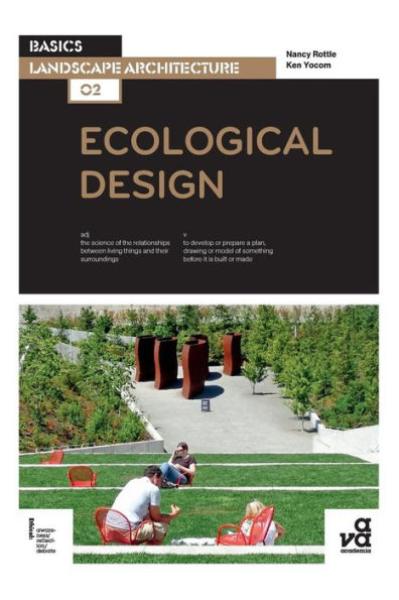Description
Basics Landscape Architecture 02: Ecological Design provides an overview of ecological design and planning for landscape architects. It explores the concepts and themes important to the contemporary practice of ecological design and planning in a highly accessible and richly illustrated format. Focusing primarily on urban environments, this book examines the relationships between ecological design theory and design methods. It describes and illustrates the basic structures and functions of natural and human systems through landscape ecology principles and the dynamics of landscape processes.
The authors explore the key concepts and themes that are important to ecological design within landscape architecture.
Nancy Rottle, Associate Professor, Landscape Architecture, University of Washington, USA. She has over two decades of landscape architecture professional experience and has been teaching since 2001. Her recent scholarship, including the co-authored book Ecological Design, has focused on the application of theory and new practices to regenerate the health of urban and urbanizing environments.
Ken Yocom is an ecologist and landscape architect based in Seattle, Washington. He teaches in the Landscape Architecture Department at the University of Washington. Ken began his career as a wildlife ecologist working on a wide range of projects across the Pacific Northwest before migrating into landscape architecture.
A beautifully crafted and designed book that gives an excellent general survey of the breadth of ecological design initiatives worldwide. The multitude of photographs and illustrations - especially those that give a sense of construction details and technical aspects of selected projects - are especially helpful for students, or practitioners who wish to develop a basic technical understanding of various aspects of ecological design.
Bill Wenk, Founder and President of Wenk Associates, USA
Climate change, urbanisation and globalisation make Ecological Design extremely timely. A clear theoretical framework and an excellent choice of case studies from the best sustainable designs around the world make this book a scientific "bestseller" for academics, practitioners and students who are searching for guidance in creating resilient sustainable cities.
Maria Ignatieva, Swedish University of Agricultural Sciences, Sweden
This lively, engaging primer provides a succinct explanation of the value and the benefits of ecological design. The book includes numerous, colorful examples of how ecological design is being realized globally.
Frederick Steiner, University of Texas at Austin, USA
The authors explore the key concepts and themes that are important to ecological design within landscape architecture.
Nancy Rottle, Associate Professor, Landscape Architecture, University of Washington, USA. She has over two decades of landscape architecture professional experience and has been teaching since 2001. Her recent scholarship, including the co-authored book Ecological Design, has focused on the application of theory and new practices to regenerate the health of urban and urbanizing environments.
Ken Yocom is an ecologist and landscape architect based in Seattle, Washington. He teaches in the Landscape Architecture Department at the University of Washington. Ken began his career as a wildlife ecologist working on a wide range of projects across the Pacific Northwest before migrating into landscape architecture.
A beautifully crafted and designed book that gives an excellent general survey of the breadth of ecological design initiatives worldwide. The multitude of photographs and illustrations - especially those that give a sense of construction details and technical aspects of selected projects - are especially helpful for students, or practitioners who wish to develop a basic technical understanding of various aspects of ecological design.
Bill Wenk, Founder and President of Wenk Associates, USA
Climate change, urbanisation and globalisation make Ecological Design extremely timely. A clear theoretical framework and an excellent choice of case studies from the best sustainable designs around the world make this book a scientific "bestseller" for academics, practitioners and students who are searching for guidance in creating resilient sustainable cities.
Maria Ignatieva, Swedish University of Agricultural Sciences, Sweden
This lively, engaging primer provides a succinct explanation of the value and the benefits of ecological design. The book includes numerous, colorful examples of how ecological design is being realized globally.
Frederick Steiner, University of Texas at Austin, USA
Last updated on
Product Details
- Bloomsbury Academic Brand
- Aug 22, 2011 Pub Date:
- 2940411441 ISBN-10:
- 9782940411443 ISBN-13:
- 175 Pages
- 9 in * 6.1 in * 0.7 in Dimensions:
- 1 lb Weight:




